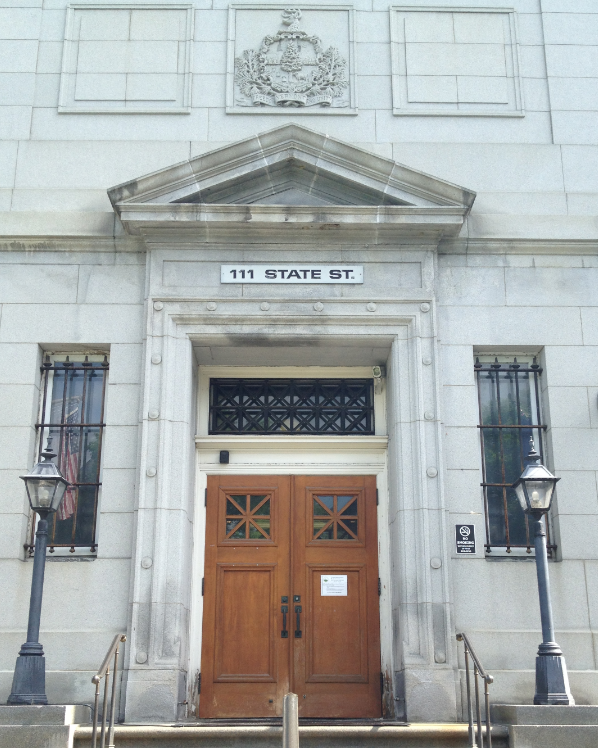City of Montpelier v. Barnett, 2012 VT 32 (Dooley, J.)
Defendants appeal from a judgment ruling that the City of Montpelier may prohibit boating, fishing, and swimming in Berlin Pond, a public body of water located outside the City and used as the City’s drinking water supply. The City contends that the restrictions are supported by both a state health order and the powers granted to the City by the State. The trial court issued a permanent injunction preventing defendants from engaging in the listed recreational activities and from trespassing upon land surrounding the pond that is owned by the City. We reverse the part of the judgment enjoining defendants from boating, fishing, and swimming in Berlin Pond.
Berlin Pond is a natural body of water, roughly two miles long and covering approximately 256 acres. Berlin Pond has supplied Montpelier with a gravity-fed water supply since 1884. Over the years, the City has acquired almost all the land surrounding the pond. The only exception is an eighty-five-foot access strip that is owned by the Town of Berlin. The City has placed “no trespassing” signs around Berlin Pond and has posted the land around it against hunting and fishing. The City has has passed an ordinance aimed at protecting the water supply.
On September 6, 2009, Cedric and Leslie Sanborn ventured out on Berlin Pond in kayaks. The Montpelier Police Department arrested them and charged them with violation of Montpelier’s ordinance against misusing a reservoir; and violation of Montpelier’s ordinance prohibiting trespassing on city property or resources. A few months later, Barnett obtained a permit to hold an ice fishing derby on Berlin Pond. These events prompted the City of Montpelier to initiate the present action against the defendants seeking a declaratory judgment that boating, fishing, and bathing is prohibited
We first reject defendant’s argument that the trial court erred in dismissing the State as a party. The State was properly joined as a necessary party defendant under Rule 19(a), because the State has an interest in Berlin Pond as public trustee, and protection of that interest might have been impaired in its absence by a decision in favor of the City. After being joined, the State refused to align its interests with either party, essentially avowing to the court that it did not have an interest that would be jeopardized by deciding this case in its absence. This removed the basis for Rule 19 joinder, so there was no error in dismissing the State.
Montpelier does not “own” Berlin pond; it owns most of the land surrounding the pond and has a right to take water from the pond. Both the public trust doctrine and Dillon’s Rule support the proposition that the City of Montpelier cannot regulate the use of Berlin Pond unless its authority derives from the State—as both trustee over public waters and as the source of municipal powers generally.
Since 1777 the Vermont Constitution has recognized the public trust doctrine:
The inhabitants of this State shall have liberty in seasonable times, ... to fish in all boatable and other waters (not private property) under proper regulations, to be made and provided by the General Assembly.
The City makes two arguments to show that the State has authorized a prohibition on activities in and around Berlin Pond. The first relies on a 1926 order by the state Board of Health that prohibited boating, fishing, and bathing in Berlin Pond. The City contends that the content of this order is still in force today. We reject this argument. Although there clearly was for many years a state health order prohibiting recreational use of Berlin Pond, that order is no longer valid and has not been implicitly adopted by ANR.
Second, the City argues that the State granted it the power to regulate Berlin Pond when it ratified the city charter and that therefore its regulation is a proper exercise of delegated authority. After careful examination of the state statutes and the City’s charter, we are unable to find any direct or indirect authorization for the City to regulate recreational use of Berlin Pond. On the contrary, the State has developed its own regulatory schemes to govern both public water sources and recreational use of public waters. Under neither of these schemes has the State prohibited the recreational uses at issue here.
Our opinion today does not hold that recreational use of Berlin Pond must be permitted. Our decision reflects the fact that, under the laws of this state, the recreational use of Berlin Pond is a matter of state concern requiring a resolution at the state level. Cf. Cent. Vt. Ry., 153 Vt. at 346, 571 A.2d at 1132 ("[T]he state's power to supervise trust property in perpetuity is coupled with the ineluctable duty to exercise this power."). We determine only that the City's current powers are limited to preventing trespass upon its property. We conclude only that valid regulation would require action by the State—either by direct regulation or by delegating such power to the City—and this has not yet occurred.
